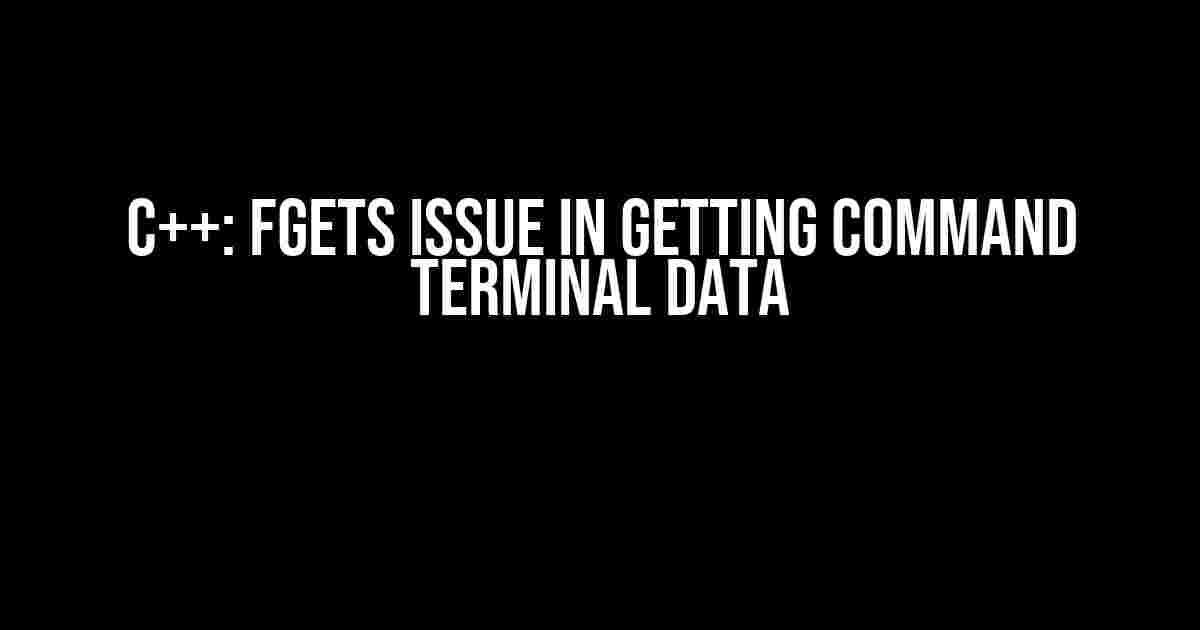Are you tired of struggling with the age-old problem of getting command terminal data in C++ using fgets? Well, you’re in luck! In this article, we’ll dive deep into the world of fgets and explore the common issues that arise when trying to get command terminal data. By the end of this tutorial, you’ll be a fgets master, effortlessly extracting data from the command terminal like a pro!
What is fgets?
Before we dive into the issues, let’s take a step back and understand what fgets is all about. fgets is a standard C library function that reads a line from the standard input (usually the keyboard) and stores it in a character array. It’s a powerful tool for getting user input, but it can be a bit finicky when it comes to dealing with command terminal data.
The Problem: fgets and Command Terminal Data
So, what’s the problem? Why can’t we simply use fgets to get command terminal data? The issue lies in the way fgets handles the input buffer. When you use fgets, it reads the input buffer until it reaches the newline character (‘\n’). However, when it comes to command terminal data, the input buffer doesn’t always contain a newline character. This can lead to fgets blocking indefinitely, waiting for input that never arrives.
Symptoms of the Problem
Here are some common symptoms you might encounter when trying to use fgets to get command terminal data:
- Your program hangs indefinitely, waiting for input that never arrives.
- fgets returns NULL, indicating that an error occurred.
- The input buffer is not cleared, causing subsequent fgets calls to fail.
The Solution: Using fgets with Command Terminal Data
Don’t worry, we’ve got a solution! To use fgets with command terminal data, you need to take a few extra precautions. Here’s a step-by-step guide to help you overcome the common issues:
- Flush the input buffer: Before calling fgets, make sure to flush the input buffer using fflush(stdin). This ensures that any stale data is cleared, and fgets can read fresh input.
- Check for input availability: Use the feof() function to check if there’s any input available in the standard input. If there’s no input, fgets will block indefinitely.
- Use a loop to handle incomplete input: fgets might not always read the entire input line. Use a loop to handle incomplete input and ensure that you get the entire line.
- Handle errors gracefully: Always check the return value of fgets and handle errors accordingly.
#include <iostream>
#include <cstdio>
int main() {
char buffer[1024];
printf("Enter a command: ");
fflush(stdin); // Flush the input buffer
while (fefo(stdin) == 0) { // Check for input availability
if (fgets(buffer, 1024, stdin) == NULL) {
printf("Error reading input!\n");
return 1;
}
// Process the input buffer
printf("You entered: %s\n", buffer);
}
return 0;
}
Alternative Solutions
While fgets is a powerful tool, it might not always be the best choice for getting command terminal data. Here are a few alternative solutions you can consider:
- getline(): The getline() function is a more modern alternative to fgets. It’s more flexible and can handle input of arbitrary length.
- read(): The read() system call is a low-level function that allows you to read data from the standard input. It’s more efficient than fgets but requires more manual handling of the input buffer.
- Cin streams: If you’re working with C++ streams, you can use the cin object to get command terminal data. This is a more C++-way of doing things, but it might not be suitable for all situations.
| Function | Description | Pros | Cons |
|---|---|---|---|
| fgets() | Reads a line from the standard input | Easy to use, suitable for most situations | Blocks indefinitely if no newline character is found |
| getline() | Reads a line from the standard input with arbitrary length | More flexible, can handle input of arbitrary length | Not available in standard C, requires C++ |
| read() | Low-level system call to read data from the standard input | Efficient, low-level control | Manual handling of input buffer required, error-prone |
| Cin streams | Uses the cin object to get command terminal data | Easier to use, more C++-way of doing things | Not suitable for all situations, might not work with command terminal data |
Common Pitfalls and Troubleshooting
Even with the solutions provided, you might still encounter issues when using fgets with command terminal data. Here are some common pitfalls to watch out for:
- Not flushing the input buffer: Make sure to flush the input buffer using fflush(stdin) before calling fgets.
- Not checking for input availability: Always use feof() to check if there’s any input available in the standard input.
- Not handling incomplete input: Use a loop to handle incomplete input and ensure that you get the entire line.
- Not handling errors gracefully: Always check the return value of fgets and handle errors accordingly.
Conclusion
In conclusion, fgets can be a powerful tool for getting command terminal data, but it requires some careful handling to avoid common pitfalls. By following the solutions and guidelines outlined in this article, you’ll be well on your way to mastering fgets and extracting data from the command terminal like a pro!
Remember, when working with fgets, it’s essential to flush the input buffer, check for input availability, handle incomplete input, and handle errors gracefully. With these tips and tricks, you’ll be able to overcome the common issues and get the data you need from the command terminal.
So, what are you waiting for? Go ahead, give fgets a try, and start extracting that command terminal data like a pro!
Frequently Asked Question
Curious about C++? Dive into our FAQs to resolve your fgets conundrums and get command terminal data flowing smoothly!
Why does fgets() return NULL when trying to read from the standard input stream (stdin)?
fgets() returns NULL if an error occurs or if the end of the file is reached. When reading from stdin, ensure that the input stream is not closed or redirected. Also, check for any preceding unformatted input that might be causing issues. Use the feof() and ferror() functions to verify the state of the input stream.
How can I use fgets() to read a line of input from the terminal and store it in a C++ string?
fgets() returns a C-style string, but you can easily convert it to a C++ string using the std::string constructor. Use fgets() to read the input, and then construct a std::string object from the resulting char array. Don’t forget to remove the trailing newline character (‘\n’) from the input string!
What is the difference between fgets() and getline() in C++?
fgets() is a C standard library function that reads a line of input from a stream, whereas getline() is a C++ function that reads a line of input from a stream and stores it in a std::string object. getline() is generally safer and more convenient, as it automatically manages memory and handles errors better. However, fgets() can be useful when working with C-style strings or when performance is critical.
Why does fgets() include the newline character (‘\n’) at the end of the input string?
fgets() includes the newline character (‘\n’) at the end of the input string because it is part of the input stream. If you don’t want the newline character, you can remove it manually using strchr() or by using the std::string::erase() method. Alternatively, you can use the getline() function, which automatically removes the newline character.
Is it possible to use fgets() to read input from a file instead of the terminal?
Yes! fgets() can be used to read input from a file by passing a file stream (e.g., FILE* fp) as the first argument instead of stdin. Just ensure that the file is opened in read mode and that you’ve checked for potential errors after opening the file. fgets() will then read from the file instead of the terminal.




